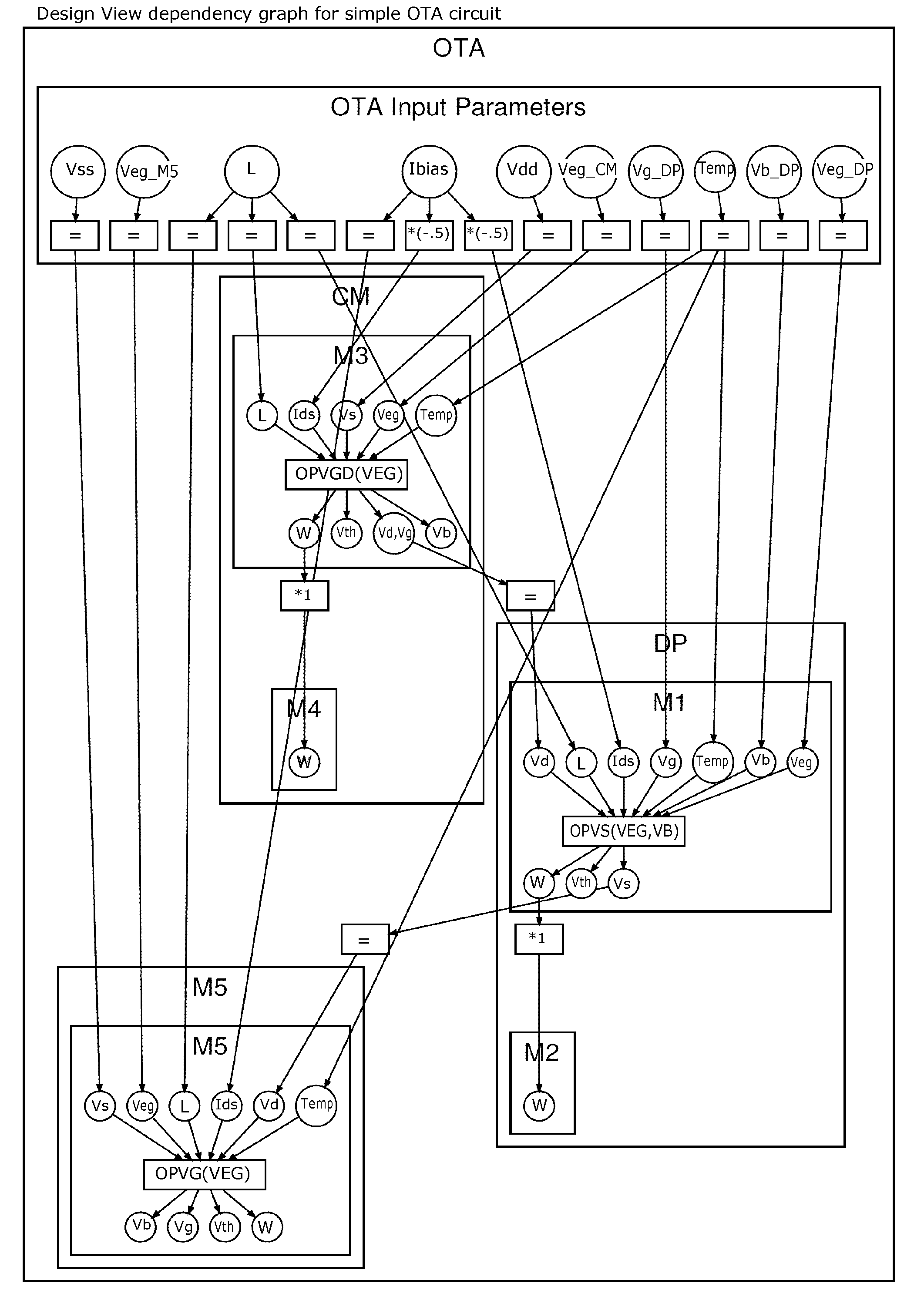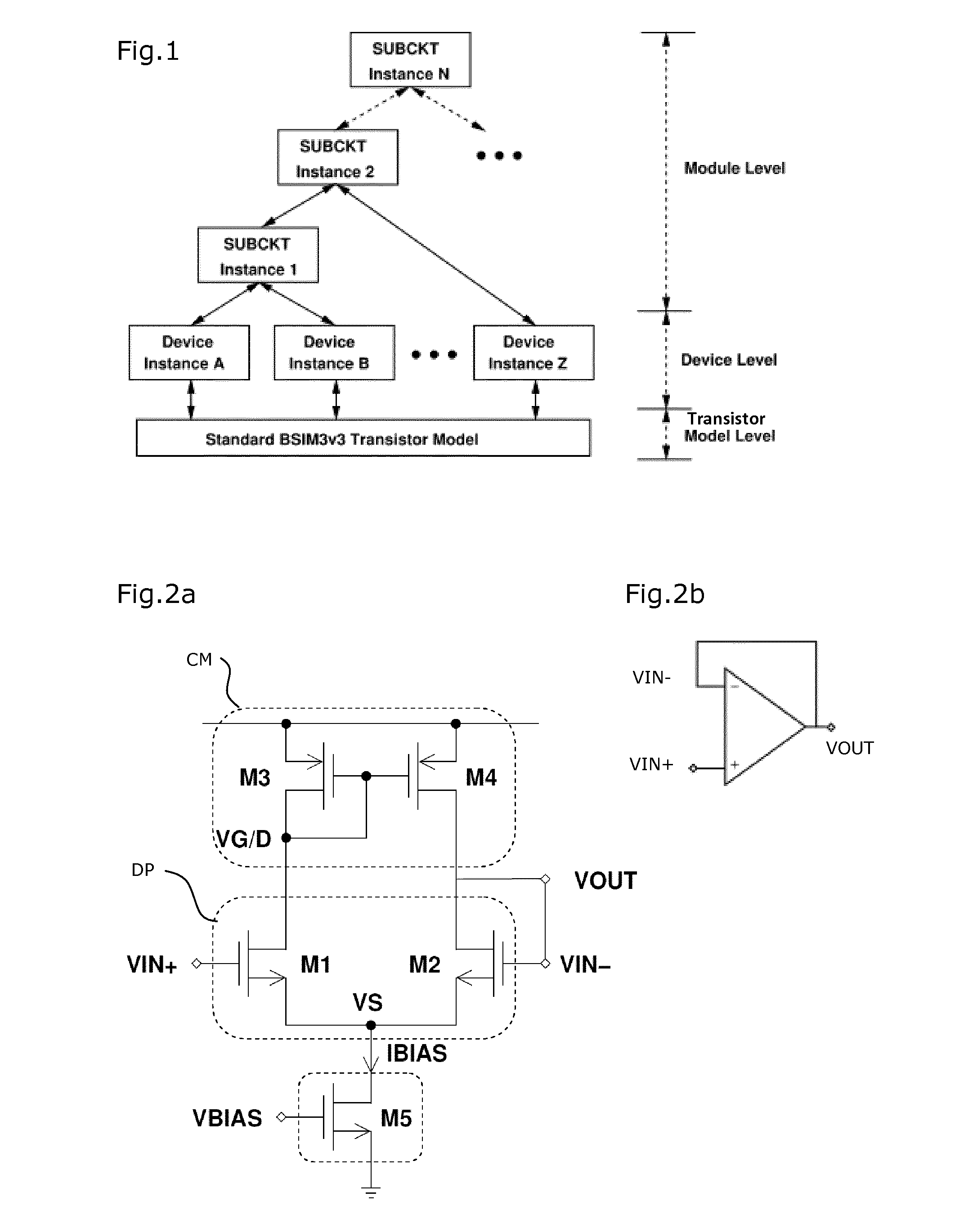Method for automated assistance to design nonlinear analog circuit with transient solver
an analog circuit and solver technology, applied in the direction of cad circuit design, program control, instruments, etc., can solve the problems of inability to reuse existing ip blocks, analog portion can be more time-consuming to develop, and nonlinear unitary devices are very complex to model when used in an analog contex
- Summary
- Abstract
- Description
- Claims
- Application Information
AI Technical Summary
Benefits of technology
Problems solved by technology
Method used
Image
Examples
case labeled bd
[0175]The content of various operators may depend on the type of connection existing between the currently processed transistor's terminals, which are illustrated in FIG. 11 and FIG. 12, where “D” is Drain terminal, “G” is Gain terminal, “S” is Source terminal, and “B” is Bulk terminal:[0176]case labeled NBND: The 4 terminals: D, G, S, B are independent, as illustrated in FIG. 11a for NMOS and in FIG. 12a for the PMOS;[0177]case labeled BND: The Source is connected to the Bulk, there are 3 independent terminals: D, G, S / B, as illustrated in FIG. 11b for NMOS and in FIG. 12b for the PMOS;[0178]case labeled NBD: The Drain is connected to the Gate, there are 3 independent terminals: D / G, S, B, as illustrated in FIG. 11c for NMOS and in FIG. 12c for the PMOS;[0179] The Drain is connected to the Gate and the Source is connected to the Bulk, there are 2 independent terminals: D / G, S / B, as illustrated in FIG. 11d for NMOS and in FIG. 12d for the PMOS.
[0180]FIG. 13, FIG. 14, FIG. 15 and FIG...
case bd
[0188]These four operator terminal currents are computed from the 3 MOS currents “iD” (flowing into the Drain), “iG” (into the Gate) and “iB” (flowing out of the Bulk), in a different way for each of the four configurations NBND, NBD, BND, BD, as follows:[0189]for an NMOS transistor:[0190]case NBND:[0191]iD_op=iD[0192]iB_op=−iB[0193]iG_op=iG[0194]iS_op=−iD−iG+iB[0195]case NBD:[0196]iD_op=iD+iG[0197]iB_op−iB[0198]iG_op=iG[0199]iS_op=−iD−iG+iB[0200]case BND:[0201]iD_op=iD[0202]iB_op=−iB[0203]iG_op=iG[0204]iS_op=−iD−iG[0205][0206]iD_op=iD+iG[0207]iB_op=−iB[0208]iG_op=iG[0209]iS_op=−iD−iG[0210]for an PMOS transistor:[0211]case NBND:[0212]iD_op=iD[0213]iB_op=−iB[0214]iG_op=iG[0215]iS_op=−iD−iG+iB[0216]case NBD:[0217]iD_op=iD+iG[0218]iB_op=−iB[0219]iG_op=iG[0220]iS_op=−iD−iG+iB[0221]case BND:[0222]iD_op=ID[0223]iB_op=−iB[0224]iG_op=iG[0225]iS_op=−iD−iG[0226]case BD:[0227]iD_op=iD+iG[0228]iB_op=−iB[0229]iG_op=iG[0230]iS_op=−iD−iG
[0231]This computing is done here by a “Compute Operator Curr...
PUM
 Login to View More
Login to View More Abstract
Description
Claims
Application Information
 Login to View More
Login to View More - R&D
- Intellectual Property
- Life Sciences
- Materials
- Tech Scout
- Unparalleled Data Quality
- Higher Quality Content
- 60% Fewer Hallucinations
Browse by: Latest US Patents, China's latest patents, Technical Efficacy Thesaurus, Application Domain, Technology Topic, Popular Technical Reports.
© 2025 PatSnap. All rights reserved.Legal|Privacy policy|Modern Slavery Act Transparency Statement|Sitemap|About US| Contact US: help@patsnap.com



